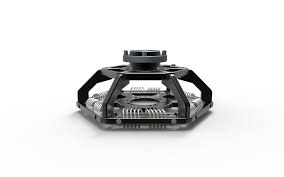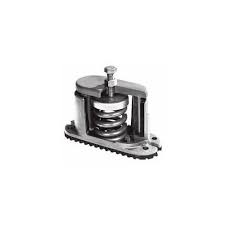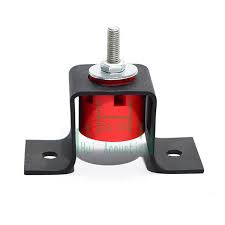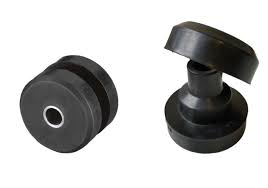Reduce Engine Vibration with High-Quality Motor Vibration Isolators
Motor vibration isolators are an essential component for reducing engine vibration in any type of machinery or vehicle. These high-quality isolators are designed to absorb and dissipate the vibrations produced by the motor, ultimately improving the overall performance and longevity of the machine. By effectively minimizing engine vibration, motor vibration isolators not only enhance user comfort, but also reduce the risk of damage to surrounding components. In this article, we will explore the benefits of using high-quality motor vibration isolators and how they can help to improve the efficiency and reliability of various types of equipment.
High-quality motor vibration isolators are an essential component in reducing engine vibration. These isolators are designed to absorb and dampen the vibrations produced by the engine, resulting in smoother operation and increased overall performance. By using high-quality motor vibration isolators, it is possible to minimize the negative effects of engine vibration on other components and systems, leading to improved reliability and longevity of the machinery. Additionally, these isolators help to reduce noise and discomfort caused by excessive engine vibration, creating a more pleasant and efficient working environment. Overall, investing in high-quality motor vibration isolators is a crucial step in maintaining the health and functionality of an engine while improving the overall user experience.
High-quality motor vibration isolators are designed to minimize the vibrations produced by engines, leading to smoother operation and improved performance. They absorb and dampen the vibrations, preventing them from negatively affecting other components and systems. In addition to reducing noise and discomfort caused by engine vibration, these isolators can also contribute to the overall longevity and reliability of the machinery. Investing in high-quality motor vibration isolators is essential for maintaining engine health and enhancing the working environment.
Understanding the Importance of Motor Vibration Isolators
building vibration isolation

Motor vibration isolators are essential components in industrial machinery and equipment. These isolators are designed to reduce the transmission of vibration and noise from the motor to the surrounding environment. By absorbing the energy generated by the motor, they help to minimize the impact on other components, improve overall performance, and prolong the lifespan of the equipment. Proper selection, installation, and maintenance of motor vibration isolators are crucial to ensure effective vibration control and minimize the risk of costly damage and downtime.
Motor vibration isolators are crucial components in various industrial and commercial applications. They are designed to reduce the transmission of vibration from the motor to its surrounding environment, thus minimizing noise, structural damage, and potential harm to nearby equipment or personnel. By effectively isolating the motor from its mounting surface, vibration isolators help to prolong the lifespan of the motor and surrounding components. They also contribute to improved performance and efficiency by minimizing unwanted vibrations that can affect the operation of the motor and associated machinery. Additionally, motor vibration isolators play a key role in enhancing overall workplace safety and comfort. By reducing the transmission of vibration, they help create a more ergonomic and pleasant working environment for personnel who may otherwise be exposed to excessive noise and vibration levels. In summary, understanding the importance of motor vibration isolators is essential for ensuring efficient and safe motor operation, minimizing noise and vibration, and prolonging the lifespan of equipment and machinery in industrial and commercial settings.
Types of Motor Vibration Isolators and Their Applications

Vibration isolators are essential in controlling excessive vibrations in motor applications. There are several types of motor vibration isolators, including: 1. Spring isolators: These isolators utilize steel springs to effectively isolate and control vibrations in motor applications. They are commonly used in heavy-duty industrial machinery and equipment. 2. Rubber isolators: Made from high-quality rubber compounds, these isolators are used to isolate and reduce vibrations in various motor applications. They are commonly found in HVAC equipment and automotive engines. 3. Air isolators: These isolators use compressed air to provide vibration isolation in motor applications. They are often used in precision equipment, such as laboratory instruments and medical devices. Each type of vibration isolator has specific applications based on the level of vibration control required and the environment in which the motor operates. Choosing the right type of isolator is crucial in ensuring the efficient and reliable operation of motor systems.
The Advantages of Using Motor Vibration Isolators in Industrial Settings

Motor vibration isolators are essential in industrial settings for several reasons. Firstly, they reduce the transmission of vibration and noise from the motor to the surrounding equipment, thus preventing damage and wear. This ultimately leads to reduced maintenance and repair costs. Additionally, vibration isolators can improve the overall workplace safety by minimizing the risk of accidents and injuries caused by excessive vibration. Furthermore, they can enhance the overall performance and lifespan of the motor and its associated components by absorbing and isolating the vibrations. This ultimately leads to increased productivity and efficiency in industrial operations. Overall, the use of motor vibration isolators in industrial settings can provide significant advantages in terms of cost savings, safety, and performance.
Factors to Consider When Choosing Motor Vibration Isolators

- The weight and size of the equipment or machinery the motor vibration isolators are intended for should be considered. Properly sized isolators are essential for effective vibration control and to prevent premature wear and tear. - The type of vibration isolator needed will depend on the application and the level of isolation required. Compression mounts, shear mounts, and wire rope isolators are some of the options available, each with its own advantages and limitations. - Environmental factors should be taken into account, including temperature, moisture, and exposure to chemicals or other corrosive substances. The isolators should be able to withstand the specific conditions of the application environment. - Durability and material quality of the isolators are crucial. Factors such as the type of rubber or other isolation material, as well as the construction of the isolator, can impact its longevity and effectiveness. - The frequency and amplitude of the vibrations to be isolated should be analyzed to select isolators that are designed to handle those specific vibration characteristics. This may involve consulting with a vibration control expert or conducting a vibration analysis. - Installation and maintenance requirements should also be considered. Some isolators may require specialized tools or techniques for installation, and certain types of isolators may need regular inspections or maintenance to ensure continued performance. - Cost considerations are important, but should not be the sole factor in choosing motor vibration isolators. Quality and performance should take precedence over upfront cost to ensure the long-term effectiveness of the isolators.
How to Properly Install and Maintain Motor Vibration Isolators<
vibration isolation systems/h2>
Motor vibration isolators are essential for reducing noise and vibration in industrial and mechanical systems. Here are some steps to properly install and maintain these isolators: 1. Choose the Right Isolator: Select motor vibration isolators that are capable of handling the weight and vibrations produced by the motor. Consider factors such as load capacity, type of vibration (axial, radial, or angular), and environmental conditions. 2. Proper Mounting: Ensure that the isolators are correctly mounted to the motor and the machinery base. Follow the manufacturer's guidelines for mounting orientation and tightening torque to avoid overloading or damaging the isolators. 3. Regular Inspection: Inspect the isolators regularly for signs of wear, damage, or misalignment. Replace any worn or damaged isolators to maintain proper vibration isolation. 4. Keep Clean: Keep the isolators clean and free from debris, oil, or other contaminants that can affect their performance. Regularly clean the isolators and surrounding area to prevent buildup of dirt or foreign particles. 5. Monitor Vibration Levels: Periodically monitor the vibration levels of the motor and machinery to ensure that the isolators are effectively reducing vibrations. Adjust or replace isolators as necessary to maintain optimum performance. By following these guidelines, you can ensure that motor vibration isolators are properly installed and maintained for optimal noise and vibration reduction in industrial and mechanical systems.
The Role of Motor Vibration Isolators in Preventing Equipment Damage
Motor vibration isolators play a crucial role in preventing equipment damage by reducing the transfer of vibration from machinery to its surroundings. By doing so, they help prevent fatigue failure, misalignment, and other issues caused by excessive vibration. Vibration isolators also help to extend the lifespan of equipment and reduce the need for frequent maintenance and repairs. This can ultimately lead to cost savings for businesses and ensure the smooth and efficient operation of their equipment.
Comparing Different Brands of Motor Vibration Isolators
Motor vibration isolators are used to reduce vibrations and noise in various industrial and commercial applications. When comparing different brands of motor vibration isolators, it is important to consider factors such as load capacity, material durability, isolation efficiency, and cost. Some brands may offer isolators with higher load capacities, making them suitable for heavier machinery and equipment. Others may prioritize the use of high-quality materials that provide better durability and resistance to wear and tear. Isolation efficiency is another important factor to consider, as some brands may offer isolators with better vibration reduction capabilities, leading to a quieter and smoother operation of the equipment. Lastly, cost is always a consideration when comparing different brands. It is important to find a balance between the initial investment and the long-term benefits of using high-quality motor vibration isolators. Ultimately, the best brand of motor vibration isolators will depend on the specific requirements of the application, and a thorough comparison of different brands can help in making an informed decision.
Innovations in Motor Vibration Isolator Technology
Innovations in motor vibration isolator technology have focused on developing more effective and efficient systems for reducing noise and vibration in industrial and commercial applications. One key area of advancement has been the development of smart or active vibration isolators that can automatically adjust their stiffness and damping properties based on real-time sensor data. Additionally, there have been improvements in the materials and designs used in passive vibration isolators, such as the use of advanced polymers and composite materials to achieve greater isolation performance. These advancements have allowed for better control of vibrations and increased protection of sensitive equipment and structures from damage. Overall, the continued development of motor vibration isolator technology has helped to enhance the overall performance and reliability of industrial machinery and equipment.
In conclusion, motor vibration isolators are essential for reducing engine vibration and improving overall performance. By investing in high-quality isolators, vehicle owners can minimize wear and tear on their engines, decrease noise levels, and enhance driving comfort. With the right isolators in place, drivers can enjoy a smoother and more efficient ride while also extending the lifespan of their vehicles. Overall, motor vibration isolators are a crucial component for optimizing engine performance and ensuring a more enjoyable driving experience.
See also
https://www.enidine.com/en-us/products/aerospace/vibration-isolation
Comments
Post a Comment